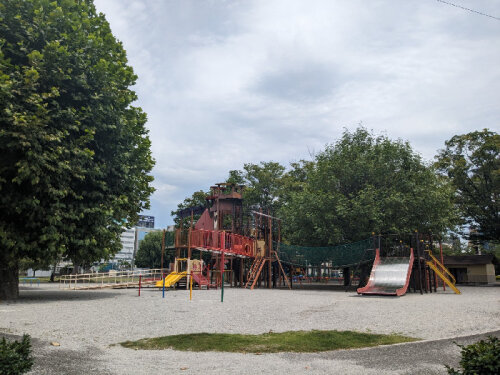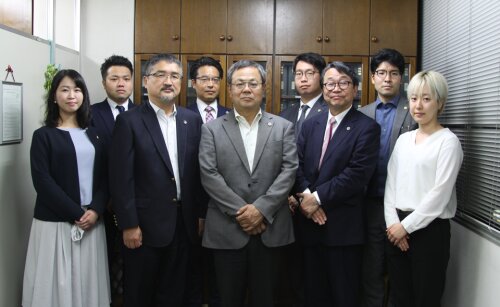Best Truck Accident Lawyers in Shizuoka
Share your needs with us, get contacted by law firms.
Free. Takes 2 min.
List of the best lawyers in Shizuoka, Japan
About Truck Accident Law in Shizuoka, Japan
Truck accidents in Shizuoka are handled under the same national legal framework that applies across Japan, with practical enforcement and local procedures carried out by Shizuoka Prefectural authorities. Legal issues that arise after a truck accident typically fall into three main categories - criminal liability, civil compensation claims, and administrative enforcement of transportation and labor rules. Criminal liability may arise if a driver acted negligently or recklessly and caused injury or death. Civil claims seek compensation for medical costs, lost earnings, pain and suffering, disability, and funeral expenses. Administrative enforcement addresses compliance with safety standards, vehicle maintenance, driver qualifications, and working hours under rules supervised by the prefectural transport office and the Ministry of Land, Infrastructure, Transport and Tourism.
Because trucks are heavy vehicles that can cause serious harm, claims often involve multiple responsible parties - the truck driver, the transport company or employer, vehicle owner, and sometimes cargo shippers or maintenance providers. The interaction among police investigation, insurer procedures, and civil claims makes truck accident cases more complex than many car accidents.
Why You May Need a Lawyer
There are several common situations in which hiring a lawyer can make a significant difference:
- Serious injury or death. When injuries are severe, or a loved one has died, legal advice is essential to calculate fair compensation and pursue claims against multiple parties.
- Disputed liability. Trucks, routes, loading, or witness testimony may produce conflicting accounts. A lawyer can collect evidence, obtain expert opinions, and present a coherent legal claim.
- Complex insurance issues. Trucking companies frequently carry multiple policies - compulsory automobile liability insurance, voluntary insurance, and employer liability coverage. Insurers may dispute causation, apportion blame, or offer low settlements. Lawyers negotiate with insurers and can bring suit if needed.
- Multiple defendants. Where both a driver and a company or a third party may be partly liable, lawyers can manage claims against several parties and pursue joint and several liability where applicable.
- Criminal investigations. If the driver faces criminal charges, victims and families may need legal representation to protect their civil interests and to claim compensation that may tie into criminal proceedings.
- Cross-border or language issues. For non-Japanese residents, lawyers help navigate language barriers, documentation, and coordination with embassies or consulates.
Local Laws Overview
Key legal elements relevant to truck accidents in Shizuoka include the following:
- Road Traffic Act and Penal Code - These laws govern traffic rules and criminal liability for negligent or reckless driving that causes bodily injury or death. The police conduct investigations at the scene and may detain or charge drivers when evidence supports criminal acts.
- Civil Code - Tort law governs compensation for damages caused by negligent acts. Victims may claim medical expenses, lost income, future care costs, pain and suffering, disability compensation, and funeral costs. There are statutory limitation periods for civil claims - generally a three-year period from when the victim became aware of the injury and the perpetrator, and a longer absolute limit measured from the date of the accident.
- Compulsory and voluntary vehicle insurance - Every vehicle is covered by compulsory automobile liability insurance that covers bodily injury but has limits. Most truck operators carry voluntary insurance with higher limits. Claims typically start with the insurance companies and may escalate to litigation if settlement fails.
- Administrative regulation of commercial vehicles - Trucking companies and drivers must follow safety, maintenance, and working-hour rules administered by the prefectural transport office and by the Ministry of Land, Infrastructure, Transport and Tourism. Violations can result in administrative sanctions, license suspension, or fines, and such violations may be used as evidence of negligence in civil or criminal proceedings.
- Employer liability - Under general tort principles and employment law, employers can be held vicariously liable for their employees' negligent acts committed in the course of employment. Independent contractor status and specific contractual arrangements can affect liability allocation.
- Medical assessment and disability rating - For long-term or permanent injuries, insurers and courts refer to medical records and disability evaluations. The classification of post-injury disability can significantly affect compensation amounts.
Frequently Asked Questions
What should I do immediately after a truck accident?
Prioritize safety and medical care - call emergency services for injuries and the police to report the accident. Exchange contact and insurance information with the truck driver. Take photographs of the scene, vehicle damage, road conditions, traffic signs, and any visible injuries. Get witness names and contact details. Seek medical attention even if you feel okay, and keep copies of all medical records and receipts. Do not admit fault at the scene.
How do I get an official accident report in Shizuoka?
The police who respond will produce an accident report and, if applicable, an accident certificate (事故証明書 - jiko shomeisho). You can request copies from the responding police station or the Shizuoka Prefectural Police traffic division. The accident report is important for insurance claims and any civil or criminal proceedings.
Who can be held liable in a truck accident?
Potentially liable parties include the truck driver, the trucking company or employer, the vehicle owner, maintenance contractors, and cargo shippers if loading or securing cargo contributed to the accident. Liability depends on the facts - who was negligent, whose actions caused the harm, and whether there were regulatory violations.
What types of compensation can I claim?
Common types of compensation include past and future medical expenses, lost wages and loss of earning capacity, costs for rehabilitation or future care, pain and suffering (慰謝料 - isharyo), compensation for permanent disability, and funeral expenses in wrongful death cases. Non-economic damages are assessed based on the severity of injury and loss of quality of life.
How long do I have to file a claim?
There are statutory limitation periods under the Civil Code. Generally, a victim must file a civil claim within three years from the time they knew the injury and the responsible party. There is also a longer absolute limitation measured from the date of the accident. Because time limits can vary by claim type and circumstances, consult a lawyer promptly to preserve your rights.
Can I negotiate directly with the insurer?
Yes, many victims negotiate directly with insurers. However, insurers often aim to minimize payouts. For injuries of any significance, it is advisable to consult a lawyer before accepting a settlement. A lawyer can evaluate the full scope of damages, advise on reasonable settlement ranges, and negotiate or litigate if necessary.
Will the truck driver face criminal charges?
Criminal charges may be brought if the police investigation finds negligence, recklessness, or serious regulatory violations that caused injury or death. Criminal proceedings are separate from civil claims. Even if criminal charges are not filed or result in acquittal, you may still pursue civil compensation. Victims should be aware that criminal investigations can produce useful evidence for civil cases.
How much does a lawyer cost for a truck accident case?
Fee arrangements vary. Many lawyers handling traffic accident cases in Japan use contingency-based arrangements with an initial consultation fee that may be low or waived and a success fee that is payable upon recovery. Some firms charge hourly or fixed fees for specific tasks. Ask about fee structure, retainer requirements, and a written fee agreement before hiring counsel.
What evidence is most important in a truck accident claim?
Key evidence includes the police accident report, photographs of the scene, vehicle damage, skid marks, traffic signals, witness statements, truck logs or digital tachograph data, maintenance records, driver work schedules, and medical records showing diagnosis, treatment, and prognosis. Preservation of evidence early is crucial, as logs and records may be altered or discarded.
I am not a Japanese speaker - what support is available?
If you are a foreign resident or visitor, ask a lawyer about interpretation and translation services. Many law firms in larger prefectures can provide bilingual assistance or arrange certified interpreters. You can also seek help from your embassy or consulate for guidance on local procedures and finding legal assistance.
Additional Resources
Recommended organizations and resources that can assist victims of truck accidents in Shizuoka include local and national bodies:
- Shizuoka Prefectural Police - for reporting accidents and obtaining official accident documents and updates on any criminal investigation.
- Shizuoka Prefectural Transport or Transport Bureau - for administrative matters relating to commercial vehicle licensing, safety inspections, and enforcement of transport regulations.
- Japan Federation of Bar Associations and Shizuoka Bar Association - for referrals to qualified civil and criminal lawyers who handle traffic and personal injury cases.
- Japan Legal Support Center - Houterasu - provides information about legal aid, low-cost consultations, and procedural guidance for those with limited means.
- Ministry of Land, Infrastructure, Transport and Tourism - for national rules on commercial vehicle operations, driver qualifications, and safety standards.
- Japan Automobile Federation - offers roadside assistance, accident guidance, and general support to motorists.
- General Insurance Association of Japan and major insurers - for information about compulsory and voluntary insurance systems and dispute procedures.
Next Steps
If you have been involved in a truck accident in Shizuoka, follow these practical steps:
- Seek immediate medical attention and follow up with recommended treatment. Keep all medical documents and receipts.
- Report the accident to the police and request a copy of the accident report or accident certificate.
- Collect and preserve evidence - photographs, witness contacts, vehicle details, and any digital data that may exist from the truck.
- Notify your insurer and obtain the truck operator's insurance details. Be cautious about accepting early settlement offers without legal advice.
- Contact a lawyer experienced in traffic and truck accident cases for an early case assessment. Bring all documentation, such as the police report, medical records, and any correspondence with insurers.
- Consider applying for public legal support if you have financial difficulty paying for counsel.
- Do not sign releases or settlement papers until you understand the full extent of current and future damages. Insist on a written settlement that accounts for future medical costs and long-term effects when appropriate.
- If criminal conduct appears to have caused the accident, request updates from the police and coordinate with your lawyer about civil remedies that may proceed alongside criminal proceedings.
Timely action and informed legal guidance can protect your rights and help secure fair compensation. If you are uncertain about next steps, arrange a consultation with a local lawyer to evaluate your situation and plan an effective course of action.
Lawzana helps you find the best lawyers and law firms in Shizuoka through a curated and pre-screened list of qualified legal professionals. Our platform offers rankings and detailed profiles of attorneys and law firms, allowing you to compare based on practice areas, including Truck Accident, experience, and client feedback.
Each profile includes a description of the firm's areas of practice, client reviews, team members and partners, year of establishment, spoken languages, office locations, contact information, social media presence, and any published articles or resources. Most firms on our platform speak English and are experienced in both local and international legal matters.
Get a quote from top-rated law firms in Shizuoka, Japan — quickly, securely, and without unnecessary hassle.
Disclaimer:
The information provided on this page is for general informational purposes only and does not constitute legal advice. While we strive to ensure the accuracy and relevance of the content, legal information may change over time, and interpretations of the law can vary. You should always consult with a qualified legal professional for advice specific to your situation.
We disclaim all liability for actions taken or not taken based on the content of this page. If you believe any information is incorrect or outdated, please contact us, and we will review and update it where appropriate.











